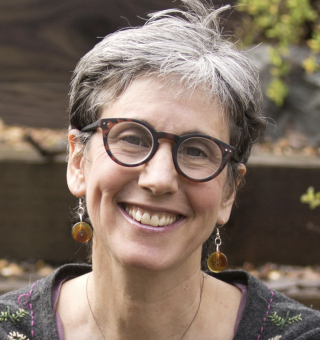Play
Infinite Play: Training for the Unexpected
Play philosopher and therapist Gwen Gordon on healing the world and ourselves.
Updated August 1, 2024 Reviewed by Tyler Woods
Key points
- If we don’t feel safe, we see the world as a battleground, where everything is a threat.
- Infinite play includes everything. There’s no winner or loser.
- Modernity relies on exploitation and extraction for constant growth; it’s a finite game on the planet.
Gwen Gordon is a trauma therapist and philosopher of play who began her career building Muppets for Sesame Street. Her research has taken her from the MIT Media Lab to San Quentin Prison. Gordon has shared her insights on play on the TED stage, at Esalen Institute, and as an experience designer at IDEO and the Coach's Training Institute. She is the author of The Wonderful W, a children's story for grown-ups, and her peer-reviewed articles have appeared in the Journal for Humanistic Psychology, Play and Culture Studies, and the American Journal of Play. She is currently in private practice for attachment and developmental trauma.
We spoke from her home in Marin County about the difference between "finite" and "infinite play," and how to shift from seeing the world as a "battleground" or "proving ground" into engaging life as a "playground" in which everything and everybody is included.

Mark Matousek: You’ve said that the same dynamics that produce novelty in the cosmos are present in the artist’s studio, in a jazz music jam, and on the preschool playground. Can you say more about that?
Gwen Gordon: Yes. The universe tries everything. Within the basic laws of the universe, there's just wild, unbridled experimentation. Whatever emerges can be used again for another purpose. Fish with fins crawl onto land and, whoa, the fins become wings. Now we're flying! This improvisational play is coming from thw frothy life force itself. It's pure Eros, the desire within existence to explore every possibility and express its fullness.
MM: How does this relate more broadly to personal evolution?
GG: I can answer this with a personal story. In my mid 20s I was a total workaholic. I was so miserable that I decided to put myself in rehab, a yoga ashram. Before I left, my sister invited me to skydive with her. Now, my sister was the women's world champion freestyle skydiver five years in a row. She had jumped out of an airplane over 5000 times and survived, so I figured I'd be okay and said yes. When we got there, the instructor told me, "There are only two things to remember. Let go of the airplane wing and breathe."
I get strapped to an experienced skydiver called a tandem master and get in the airplane. Suddenly, I get a tap on the shoulder. It's time. We sidle over to the airplane wing like beetles in heat and the tandem master says, "Let's go." Everything in my body and 150 million years of genetic memory screams, "Absolutely, under no circumstances whatsoever, let go." I let go. It's just an explosion of sensation. No one told me how cold it would be, how lout it would be, how totally overwhelming. Have you every jumped out of an airplane?
MM: You couldn’t pay me.
GG: Anyway, I look up and see my sister, twisting and flipping like a wild animal that's been released from captivity. She swoops over, gives me a kiss on the cheek, and then swoops away, flipping, twisting, and having the time of her life. In the meantime, I'm just a hunk of biomass succumbing to gravity. "What was that second thing? Oh right, breathe." I gasp. We land safely.
I get to the ashram and what does the spiritual teacher tell me? "There are only two things to remember: Let go. And breathe." He was living life dancing in free fall like my sister was. I, on the other had, was bracing hard against it. I wondered if I could ever learn to relax and play that way in free fall—with that much uncertainty, that much release, that much surrender, enjoying myself all the way.
The people I know who are most spiritually mature are in that state. For them, everything is play. I saw how my workaholic tendencies were my way of resisting free fall and that whenever I play, I relax a little bit into tiny free falls. I fee free. That's what inspired both my spiritual practice and my interest in play.
MM: What do you mean by the difference between infinite play and finite play?
GG: Not all play is evolutionary. The philosopher James Carse makes a great distinction in a beautiful book called Finite and Infinite Games. Evolutionary play is what Carse calls infinite play. It includes everything, the rules are flexible, there's no winner or loser, and its purpose is to keep the play going—versus finite play, which is the opposite. Rules are rigid. It's exclusive. and it ends with winners and losers.
The universe is an infinite game. It's the nature of reality. We humans play in the infinite game to the extent that we feel safe. If we don't feel safe, we see the world as a finite game, which can become either a battleground or a proving ground. If our sense of safety was very conditional, and we had to test it and we were tested, then the world is a proving ground where we have to continually prove ourselves. If we're very insecure, we might perceive everything as a threat in a world that feels like a battleground. If we're secure, we can tell what threats are real. The world becomes a playground mindset, where everything is included in the play. These are mindsets which get established as babies depending on the security of our attachment bonds.
MM: Let's talk about the obstacles to infinite play—and seeing the world as a playground rather than a proving ground or battleground for others, depending on our social location. How does our culture support this?
GG: I think it's pretty clear that modernity—capitalism, patriarchy, racism—is a proving ground for some and a battleground for others, depending on our social location.
Modernity relies on exploitation and extraction for the incessant growth it needs to survive; but economic growth is a finite game within finite resources. it doesn't include mountains and trees and rivers as playmates with their own inherent value and subjectivity or spirit.
We are stuck in a finite game right now, but that game is part of an infinite game, which goes beyond the human world. The more we can connect with, identify with and participate in that infinite game, the less investment we have in the finite game, and it can thin out. We divest from winning and proving at the expense of life and can be nourished by the inherent safety that comes from a felt sense of interconnection. We can live life as a play within a grand playground.
MM: Can you say more about our culture's attachment wound?
GG: The hyperindividualism and scarcity inherent in modernity is a clear symptom of anxious attachment. We don't feel securely connected with nature or spirit. Something happened in the evolution of Western culture that caused that sense of separation and with it, a profound sense of insecurity and need for domination and control. Some anthropologists suggest this disconnection occurred with the rise of agriculture when we began exerting control over the natural world. Others see it rooted in the rise of patriarchy. Whatever the cause, it created a profound sense of separation from the bosom of the larger life. This core trauma has led to a myriad of other traumas which we call civilization.
I'll just add that, even within that sense of separation, culture has played exuberantly—our art, science, music—it's irrepressible. And some have managed to play in the infinite game, which is always present. But the society itself is structured as a finite game and the many existential crises are the symptoms.
MM: And that leads to a finite game, a zero-sum way of living?
GG: Just think of the emphasis on productivity and achievement. We are defined by how well we perform—proving ourselves. People de-prioritize play to survive capitalism, and to be somebody, feel their value within cultural standards. To do that, we compete for limited resources. Play on the proving ground is mostly a way to let off steam and get temporary relief from the proving and battling, but it doesn't change the fundamental mindset.
MM: You once said that play is training for the unexpected. What did you mean?
GG: I believe it was the biologist Marc Bekoff who first used that phrase. One of the examples he gives is of baby mountain goats. By frolicking, galumphing and chasing each other, they put themselves in precarious situations that increase their coordination and strength. So, when the mountain goat stumbles on the cliff, it will have already practiced catching itself a thousand times in play. You see, life is risk, and play normalizes risk. It lets us be in control of being out of control, which helps us feel comfortable with new experiences. It takes us out of our habits and gives us a wider repertoire physically, psychologically, socially, and emotionally of possible responses to the world.
MM: For humans, play creates space to put ourselves into all kinds of tricky situations, and act out all kinds of emotions, aggression, competitiveness, and so on, in a context where they need not be toxic or nasty. Play is a risk-free environment.
GG: Play is commonly considered to exist in a special space outside of ordinary life where there are no long-term consequences. So, you can take more risks than you might tolerate in ordinary life. Make believe is a great example. When we dress up as someone else and step inside a whole other identity, we're widening our perspective and our emotional repertoire. It lets us discover we're much more than just ourselves. Breaking out of our own habits, personas, and frames makes us more adaptable.
MM: One last question. How did you shift from play into trauma work?
GG: Play, for me, has always been about freedom, being one hundred percent present and allowing life to move through me. Originally, I was captivated by play as an expression of this freedom. The ten years I spent exploring play was driven by the question of whether, if when we're free, we're free to play, can we also play our way free. In other words, is play both the path and the destination? But eventually I played it out and discovered that, while we can tap into the parts of ourselves that are free through play, we all have places where we are not free to play. These blocks are trauma. So, to liberate our free play, we need to remove the obstacles to play, heal the trauma we carry individually and collectively. We can't necessarily do that through play. Sometimes we have to open into new internal spaces in which our nervous systems can learn safety. My commitment to liberation brought me from play to trauma therapy.




